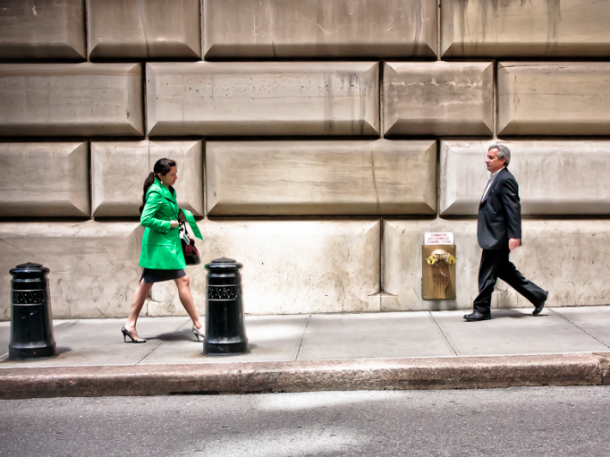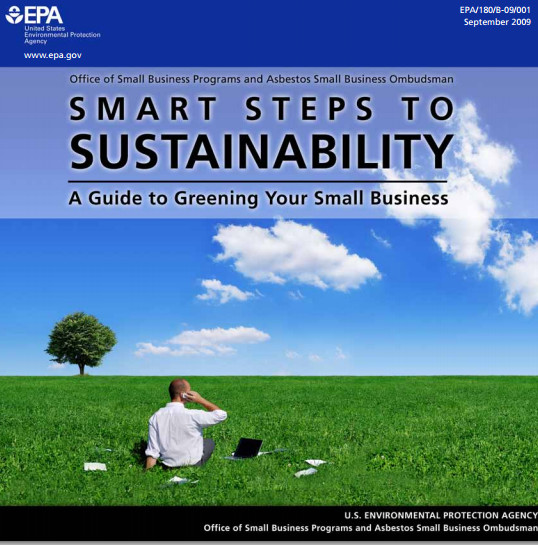
When someone says “green business” you might get the image of a shop selling hemp trousers or biodegradable coffee mugs, but the fact is green is no longer a novelty niche market and more and more businesses are not just selling green products, but operating in an environmentally friendly “green” manner.
Historically, the US has been rather slow to join the green movement. Many other countries, particularly in Europe, have been much quicker to realize the positive global impact that can be achieved through green practices. Although the US has had organizations which were focused on caring for the environment as far back as the late 1800s (The Sierra Club being one notable example), it remained largely a social movement until recently. In contrast, countries such as Germany made environmental matters of governmental concern starting in the 1980s through the establishment of a political Green Party. However, despite the country’s slowness to adapt, large cities in the US are coming around and there are many things that individual businesses can do to help.WHAT IS A GREEN BUSINESS?There is no set definition of what makes a green business since the term encompasses a wide range of ideas including organic, fair trade, environmentally friendly, energy conscious, etc. But in general terms it is accepted that green businesses attempt to have little to no negative impact on the local or global environment. Green businesses aim for a “triple bottom line,” that is, they take into account fair and ethical work standards, sustainable business practices, and economic value.Since “green” isn’t a government regulated term, there are many companies that claim to be green but don’t adhere to any specific standards. There is an abundance of unreliable certifications which have vague definitions and are often phrased in a misleading manner. It’s unfortunately an easy term to throw about, and many companies “greenwash” themselves in order to appear environmentally friendly while not actually operating in a sustainable manner.The Federal Trade Commission has issued (and enforces) “Green Guides” to aid businesses in correct marketing practices and to ensure that they have sound science backing up their claims. These guides caution marketers:
“Not to make broad, unqualified claims that a product is ‘environmentally friendly’ or ‘eco-friendly’ because the FTC’s consumer perception study confirms that such claims are likely to suggest that the product has specific and far-reaching environmental benefits. Very few products, if any, have all the attributes consumers seem to perceive from such claims, making these claims nearly impossible to substantiate.”
To avoid these potential pitfalls, it is possible to receive green/environmentally friendly certifications from some well-known and respected organizations as well as to receive some targeted sustainability certifications from the government for your products.
HOW TO HAVE A GREEN BUSINESS
 There are many ways to make your business more sustainable and these will vary depending on your industry. The Small Business Association has produced a “Green Business Guide” which provides guidelines and advice for having a greener business, marketing that business, and taking advantage of government incentives.The Environmental Protection Agency has also produced a “Smart Steps to Sustainability” guide for small businesses.Some practical things your business can do to be greener:
There are many ways to make your business more sustainable and these will vary depending on your industry. The Small Business Association has produced a “Green Business Guide” which provides guidelines and advice for having a greener business, marketing that business, and taking advantage of government incentives.The Environmental Protection Agency has also produced a “Smart Steps to Sustainability” guide for small businesses.Some practical things your business can do to be greener:
- Use only energy efficient lighting and EnergyStar certified appliances.
- Use fewer resources by installing high quality thermostats to control the temperature and set them to turn off during the hours when nobody is in your office or business location.
- Use lighting that operates on motion sensors for outdoor lighting and areas that aren’t constantly occupied, such as restrooms.
- If you are a retail or food service business, use biodegradable cups, utensils, and bags and encourage customers to bring their own re-usable items where possible such as travel mugs and shopping bags.
- Make sure your business is recycling properly and use recycled post-consumer content wherever possible.
- Switch to green power. ConEdison Solutions offers the option for residential and small business customers in NY to “go green” by choosing power that comes from renewable sources such as sun, wind or tides.
Businesses can also join the Global Reporting Initiative which aims to harmonize sustainability reporting standards among global companies and organizations and to make reporting a routine practice. If you are aiming for a greener business, the transparency and strict guidelines required by the GRI can be the catalyst for your business to maintain high sustainability standards.Some Established Green Certifications for your Business:Energy Star: was established by the Environmental Protection Agency (EPA) in 1992 in order to help consumers and businesses reduce greenhouse gas emissions. As a business you can make sure you buy Energy Star labeled appliances for use in your office or business location, get your commercial building certified by Energy Star, and, if you manufacture appliances, you can apply for Energy Star certification for your products.EPEAT: Similar to Energy Star, but specifically focused on electronics is EPEAT, an independent third-party certification organization. This company certifies electronics ranging from laptops to copy machines and is the leading registry for finding electronics which reduce environmental impact. You can search their database to find environmentally friendly electronics equipment for your office.GreenSeal certifies a wide range of products and businesses which comply with their life cycle-based sustainability standards. Once certified by GreenSeal, companies must continue to maintain rigorous standards as GreenSeal conducts periodic compliance monitoring.The Rainforest Alliance: Third-party verification coffee/tea, paper products, and furniture.Design for the Environment: Verification of cleaning products – partnered with the EPA.LEED: Third-party verification of green buildings.WHY HAVE A GREEN BUSINESS?The obvious reason to go green is that you can help the environment, which includes the environment you and your neighbors live in, not just forests in some far-off country. The quality of life for New Yorkers will improve as more businesses reduce carbon emissions, use longer-lasting products, and use renewable resources. Compared to past generations, today’s New Yorkers are much more environmentally conscious and it is becoming more and more important to consumers that the businesses from which they buy products demonstrate an interest in green practices.Along with helping the environment, being green enhances your business’ image; this is why the “greenwashing” trend is so popular. Studies show that when choosing between two otherwise equal alternatives, consumers are more likely to choose the green option. People also choose green options as a matter of social status and due to peer pressure, as found in a study by the Journal of Personality and Social Psychology. Whatever the reason may be behind a consumer’s choice to buy green, as a business it is a positive decision.Let’s not forget the monetary incentives for going green as well. Most energy efficient appliances and practices will save you money over time, even if they are more expensive to implement initially. Additionally, New York State offers a Green Building Credit and a Clean Heating Fuel Credit that can be claimed on your taxes if you meet the correct criteria.

